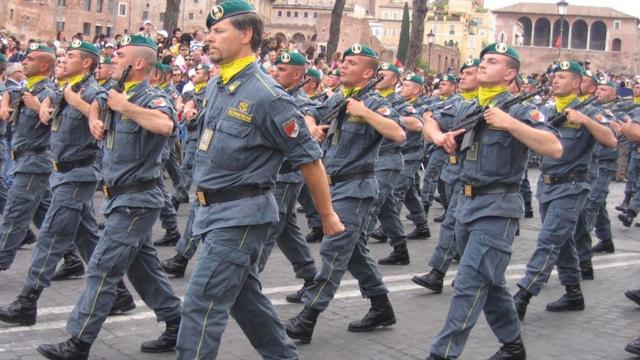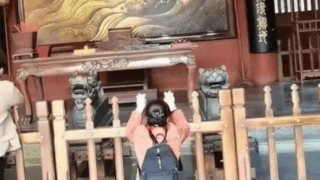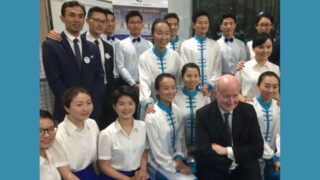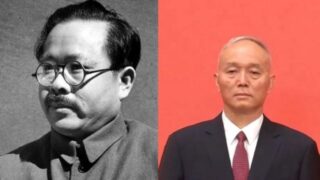A massive Italian Tax Police investigation unveiled a 15-billion-euro money laundering operation involving Italian mafia, Colombian drug barons, and Putin’s oligarchs.
by Massimo Introvigne


In September 2022, the Italian Tax Police (Guardia di Finanza), a famously effective militarized police force, visited a couple of businesspersons in Brescia, a man and his wife who had sent to Slovenia and other Eastern European countries 4.5 million euros as alleged payments of ferrous materials that had never entered Italy. Not finding the evidence they were looking for in the house, they decided to dig in the garden, where they found strange metal drums. They opened the drums, and discovered they were full of banknotes for a total of eight million euro. Another three millions euro were found buried in the couple’s cellar. All this money had come from China.
This was part of a huge investigation nicknamed “Operazione Via della Seta” (Silk Road, which is also the name used in Italian for the Belt and Road initiative), which involved hundreds of Tax Police agents for several years. What they discovered, as explained in a very detailed account of the operation published on March 5 by the Italian newspaper “La Repubblica,” may involve dramatic foreign policy consequences. Perhaps for the first time in Europe, evidence was uncovered conclusively proving that the Chinese Communist Party routinely cooperates with several criminal organizations— the Italian Mafia, Colombia’s drug cartels, and Russian oligarchs close to Putin—to launder billions of dollars.
They are billions of dollars—15 billion at least, according to the Tax Police—and yes, it is the CCP, not “Chinese organized crime” as the Beijing’s regime immediately commented, promising that those responsible will be punished. The whole operation has been traced back to those who organized it in Beijing and Shanghai: a pool of banks led by the Bank of China, which is the fourth largest bank in the world and whose majority is in the strong hands of the Party-state. “Those responsible” is obviously the CCP itself.
The Italian Tax Police became suspicious when it noted that legal transfers of money from Chinese living in Italy to China had decreased from Euro 5 billion in 2017 to Euro 9 million in 2021, which could not be explained by COVID only. They started their investigation assuming that what they called, with an English acronym, a CUB (China Underground Bank) was operating in Italy. CUB is not a real bank, and certainly not a legal bank, but is as well-organized as most banks.
Clients take cash there, which is transferred without asking questions on its provenance either to companies in Eastern Europe, including in Hungary where Chinese influence is very strong, and from there to China, or to Chinese banks directly. China, or the CCP, keeps its fair share and has its way to send the money back to Italy, again in cash. Those who had sent money to China (directly or through Eastern Europe) receive it back, minus the generous percentage kept by the CCP and its friends, and go to Chinese supermarkets or small shops to take their cash.
The Tax Police finally understood how the system worked when they found burlap sacks with millions of euros the CUB’s clients were taking out of shops owned by Chinese in the Venetian region. They discovered that the same system was at work in most Italian regions.


Who uses the CUB for laundering money? First, Chinese themselves. They specialize in opening and closing companies very quickly. These companies do not pay taxes, VAT, or social security but disappear so rapidly, together with their managers who really or supposedly go back to China, that nobody can be prosecuted. This Chinese tax evasion, the Tax Police says, has costed Italy at least Euro 2 billion. But the “clients” of the CUB are not Chinese only.
There are dishonest Italian businesspersons, such as the Brescia couple who buried the money, who have income unreported to tax authorities. Some of this money comes from businesses where payments in cash are or were comparatively common, such as the sale of used cars. In other cases, the money comes from selling drugs and involves the organized crime. The Tax Police documented cases where the Italian Mafia used the CUB to send money to China. In this case, always after the Chinese percentage was deducted, the money did not come back to Italy but was sent from China to Colombia to pay there the drug barons who had supplied cocaine and other drugs to their Italian associates. To relaunch the Italian economy after COVID, the government launched an ambitious system of financing renovations of houses and apartments by private citizens for billions of euro (so-called “Superbonus”). Sometimes, money was collected, with the complicity of corrupt bureaucrats who issued fake certifications, for renovation works that were never done. This money quickly disappeared—sometimes to China, and back in cash, through the CUB system.
After the war in Ukraine, the CUB also became a convenient service for Russian oligarchs close to Putin and targeted by sanctions. They cannot legally export money either from Russia to Italy to fuel their more or less legal activities there, or from Italy to Russia in case they decided to sell the villas or boats, registered in the name of figureheads, that they kept in the Riviera or the Tuscan coast. Here, again, the CUB was ready to help—and keep a percentage in China.


The CUB’s way of sending money to China and taking a part of it back to Italy (or elsewhere) is extremely complicated, and involves real banks in other countries, including in Switzerland. But, the Tax Police says, the time-honored system of manual smuggling is still used. Mostly at Rome’s Fiumicino airport, they seized cash for 37 million euro hidden in the hand luggage of passengers traveling to China. And they arrested a jeweler in Tuscany, who took cash from clients of the CUB and gave them gold bars, easier to take to China.
One of the largest Tax Police operations in Italian history, indeed. But there is no reason to believe the CCP is recycling money and stealing from the tax offices in Italy only. CUB is now a nickname used by other police authorities with which Italy is in contact, too. The CUB story proves that the CCP is not only a criminal organization for its political crimes and the merciless repression of ethnic and religious minorities and dissidents. It is an organization systematically perpetrating common crimes, in association with the global organized crime and other criminal groups such as Putin’s oligarchs in Russia.









